Many things are very true about Jason Reitman's pearl of a film called "Juno," and one of them is that while you're watching it, while it pulls you in as if through a portal to another life and dimension, you believe every outrageous line that comes out of the 16-year-old mouth of Juno MacGuff.
And that is why they call it great film writing, not to mention solid acting and direction.
"Juno" is this year's "Little Miss Sunshine," the quirky, unlikely sleeper hit that succeeds not with a cast of millions, or a Brangelina-ish name above the title, or with CGI effects that blast you out of your seat and implant a permanent buzzing sound in your ear, but with a confluence of perfection in every aspect of the film.
Written by blogger and former stripper Diablo Cody, directed by Ivan Reitman's kid and starring a young actress named Ellen Page with a pitch-perfect sense of character, "Juno" is the story of a high school girl who gets pregnant almost by accident. She and her best friend, Bleeker (the gifted Michael Cera of "Superbad" and TV's "Arrested Development"), planned to watch TV one night because "The Blair Witch Project" was going to be on and they hadn't seen it since it came out. But instead, they had sex.
A few weeks later, multiple home pregnancy tests (a.k.a. "pee sticks") confirm that Juno is pregnant. Her best girlfriend freaks out more than Juno does, warning her of how her body will explode and her breasts will start "milktating." For her part, Juno contemplates hanging herself with red candy rope but eats it instead on her way into her house, where, eventually, she fesses up to her dad, Mac (J.K. Simmons), and stepmom, Bren (Allison Janney).
She contemplates her choices, and pays a visit to the Women Now clinic with the intention of having "a hasty abortion," as she puts it. On the way in, an anti-abortion protester who happens to be a schoolmate tells her the fetus already has fingernails. Inside, Juno watches people in the waiting room, scratching themselves and flicking their nails, and makes a run for it. No dialogue is spoken. It could be argued that Juno doesn't really think her decision through to have her baby, but I don't buy it, nor, I suspect, will most people who see the film. Juno is not an idiot. She controls her body, her thoughts and her life, and she's empowered to do that by loving, attentive parents.
Juno decides to have her child and to give it up for adoption to a young, well-off couple who have advertised their hopes in the penny-saver, right next to the ad for exotic birds. The prospective parents are Jason Bateman, as Mark, a commercial jingle writer who can't quite let go of his youthful dream of becoming a rock star, and his maternal-minded wife, Vanessa, played by Jennifer Garner.
Many will see this film and be blown away by Cody's dialogue, by the brilliance of her words, the sizzle of the wisecracks, but perhaps the best writing in her superb script is in the development of the characters of Mark and Vanessa. They are brilliantly gray, morally ambiguous. You like them both at first. You can't help it. He seems a bit reserved, but, gosh, she wants a baby so badly and so what if she's a bit domineering and has ordered her husband to keep all the souvenirs of his youth, including his Les Paul guitar, in "his" room, so they won't clutter up the perfection of their blandly but expensively decorated home? Has she thought much about whether a child is right for both of them? Has he had the courage to tell her that maybe he's not quite ready for fatherhood?
Gradually, aspects of their respective characters come into sharper focus. We see Mark as something more predatory than just a hen-pecked, stay-at-home jingle composer who loves Sonic Youth's take on the Carpenters' "Superstar." And we see her as perhaps a bit too obsessed with motherhood, maybe even a tad selfish. Cody crafts some amazing dialogue for Juno, but the real proof of her screenwriting brilliance can be found in the quiet delicacy and subtle sadness of Mark and Vanessa's characters.
Although everyone gets some tasty lines to deliver, Juno's dialogue ripples with ironic humor, cultural awareness and what some literary critics used to call "brand-name fiction" when minimalists like Raymond Carver patented the form a few decades ago. When Vanessa first meets Juno and asks how far along she is, Juno deadpans, "I'm a junior." Contemplating how difficult it's going to be for Mark and Vanessa to adopt her baby, Juno wonders why they didn't just go to China, where "they give away babies like free iPods."
These are funny lines, and Page delivers them perfectly every time, but they also help us understand that, unlike typical movie adolescents, Juno is a complex human being. She's worldly wise, can take care of herself, will never suffer fools lightly, but as time goes on and the perfect little solution she thinks she's found begins to dissolve, another side of her emerges, the side that's still a little girl, that doesn't know all that much about life, and that is just learning that people can let you down or not live up to your idealized visions of them.
Cody's script is such a dazzler that Reitman may not get the credit he deserves for his careful direction. Only 30, he already knows that character tells and character sells. He doesn't try to jolly things up with a lot of tricky camera angles or phony effects. Instead, he focuses on the actors and their performances, and no director could ever wish for a more able cast.
Page carries most of the film, but makes it look easy, despite the complexities of Juno's character she's called on to develop along the way. Cera, of course, again proves himself a master of deadpan, a kind of modern-day Buster Keaton whose slightest gesture, the flicker of change in a facial expression, communicates every thought in his character's head and feeling in his heart.
His fellow "Arrested Development" alumnus, Bateman, is, at once, bland, reserved, emasculated, sad, then somewhat creepy and ultimately a selfish boy-man who isn't taking all that well to adulthood. As his wife, Garner has one of the best roles of her career and makes the most of it at every turn. She never stops grinning, but as we watch the way she modulates that klieg light of a smile, just a bit, here and there, she carefully reveals the mix of fear, insecurity, resentment and resolve that informs her character.
A lot of people will be happy about "Juno," but none as much as the members of the Writers Guild of America, whose continuing strike has already stalled new episodes of many TV shows and threatens future film productions as well. In Cody's script, the guild has one of the best reminders it could ever hope for of just how important high-quality writing can be to great filmmaking and great film acting.
All three elements conspire for greatness in "Juno," but there's something else at work here, and that's truth. Cody's words, Reitman's direction, the performances of the entire cast, from Page's leading role to Rainn Wilson's cameo as a convenience store clerk, are perfectly true in every moment. "Juno" isn't a film made in the bell jar of unlikely reality that is, far too often, Hollywood: It's a film whose attention to real-life detail is so fine, audiences will be hopelessly and happily lost in its story from the first frame.
Juno review
 Posted : 12 years, 7 months ago on 29 November 2012 02:27
(A review of Juno)
Posted : 12 years, 7 months ago on 29 November 2012 02:27
(A review of Juno) 0 comments, Reply to this entry
0 comments, Reply to this entry
Redwoods review
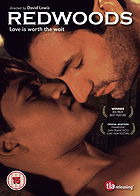 Posted : 12 years, 7 months ago on 22 November 2012 12:43
(A review of Redwoods)
Posted : 12 years, 7 months ago on 22 November 2012 12:43
(A review of Redwoods)A gay couple bound together by their love for their learning disabled son finds their relationship but to the test when one enters into a passionate romance with another man. Set against the majestic backdrop of the Russian River, Redwoods opens to find Everett and Miles settled into an uneventful life of predictable domesticity. These days, it seems like the only thing keeping them together is their mutual desire to give their son Billy the best upbringing they can. One day, Miles takes Billy on a father/son trip. While they're away, Everett befriends a traveling writer named Chase. The chemistry between the two men is instantaneous and undeniable, and before long Chase's dormant passions are reawakened. Is Miles and Everett's love strong enough to endure the challenges of a long-term relationship, or is it finally time for them to both accept the fact that they'd be better off apart.
 0 comments, Reply to this entry
0 comments, Reply to this entry
Fantastic Four review
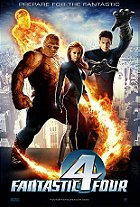 Posted : 12 years, 7 months ago on 20 November 2012 12:41
(A review of Fantastic Four)
Posted : 12 years, 7 months ago on 20 November 2012 12:41
(A review of Fantastic Four)Comic book adaptations seemed to be getting better recently and with the success of “Batman Begins”; I truly believed that the bar had been raised for such films. Then I sat through the “Fantastic Four” and had my expectations put properly in check. Hollywood has once again ruined a superhero film. Fantastic Four is terribly miscast. It’s poorly written, visually uninteresting, and worst of all, boring. The film drags considerably. There are huge gaps without any action and it brings the pacing to an unbearable crawl.
The film follows the comic book origins initially with Reed Richards (Ioan Gruffud), Ben Grimm (Michael Chiklis), Sue Storm (Jessica Alba), Johnny Storm (Chris Evans), and Victor Von Doom (Julian McMahon) genetically altered by a solar storm in space. They’re granted super powers by the accident and are forced to deal with the changes in their own way. Ben Grimm has the hardest time because his physical appearance is so drastically changed. His skin turns to rock and his world falls apart after his fiancé leaves him. Victor Von Doom (aka Dr. Doom) also undergoes a physical change, but he embraces his new power and uses it to further his own ambition. He feels betrayed by Sue Storm’s feelings for Reed Richard and vows to destroy him at all costs.
Jessica Alba and Ioan Gruffud are completely miscast. They have no chemistry whatsoever. We are supposed to believe they are former lovers and are rekindling the flame after the accident. It doesn’t work and the actors look awkward delivering their awful dialogue. Also, Sue Storm and Johnny Storm are supposed to be siblings. Jessica Alba and Chris Evans look nothing like each other. Evans does a banner job playing the c*cky and arrogant Johnny Storm, but Alba fails in her attempt to play the older, wiser sister. Their interaction looks forced and unnatural. It’s a key character element to the story and it doesn’t work at all.
The special effects in the film are sub-par. The most important visual shots are Johnny Storm’s flames and his ability to fly. It’s the lynchpin of the film and it’s not impressive. Ben Grimm’s costume looks like it’s made out of orange cardboard. Reed Richard’s stretching power is about as bad as CGI gets. There’s just nothing remotely inspiring to see. There is an awe factor that is inherent to a good superhero film and Fantastic Four is utterly lacking in that sense.
Tim Story, the director of the film, is a promising talent; but didn’t have the right vision for this type of genre. The script is weak, but I can’t help but feel that a more entertaining film could have been gleaned from it. The parts did not add up correctly and unfortunately the director has to take a hit for that mistake. Let’s hope for a better film in the future. The Fantastic Four, a beloved comic for forty years, deserve it.
The film follows the comic book origins initially with Reed Richards (Ioan Gruffud), Ben Grimm (Michael Chiklis), Sue Storm (Jessica Alba), Johnny Storm (Chris Evans), and Victor Von Doom (Julian McMahon) genetically altered by a solar storm in space. They’re granted super powers by the accident and are forced to deal with the changes in their own way. Ben Grimm has the hardest time because his physical appearance is so drastically changed. His skin turns to rock and his world falls apart after his fiancé leaves him. Victor Von Doom (aka Dr. Doom) also undergoes a physical change, but he embraces his new power and uses it to further his own ambition. He feels betrayed by Sue Storm’s feelings for Reed Richard and vows to destroy him at all costs.
Jessica Alba and Ioan Gruffud are completely miscast. They have no chemistry whatsoever. We are supposed to believe they are former lovers and are rekindling the flame after the accident. It doesn’t work and the actors look awkward delivering their awful dialogue. Also, Sue Storm and Johnny Storm are supposed to be siblings. Jessica Alba and Chris Evans look nothing like each other. Evans does a banner job playing the c*cky and arrogant Johnny Storm, but Alba fails in her attempt to play the older, wiser sister. Their interaction looks forced and unnatural. It’s a key character element to the story and it doesn’t work at all.
The special effects in the film are sub-par. The most important visual shots are Johnny Storm’s flames and his ability to fly. It’s the lynchpin of the film and it’s not impressive. Ben Grimm’s costume looks like it’s made out of orange cardboard. Reed Richard’s stretching power is about as bad as CGI gets. There’s just nothing remotely inspiring to see. There is an awe factor that is inherent to a good superhero film and Fantastic Four is utterly lacking in that sense.
Tim Story, the director of the film, is a promising talent; but didn’t have the right vision for this type of genre. The script is weak, but I can’t help but feel that a more entertaining film could have been gleaned from it. The parts did not add up correctly and unfortunately the director has to take a hit for that mistake. Let’s hope for a better film in the future. The Fantastic Four, a beloved comic for forty years, deserve it.
 0 comments, Reply to this entry
0 comments, Reply to this entry
What's Your Number? review
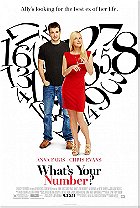 Posted : 12 years, 7 months ago on 20 November 2012 12:36
(A review of What's Your Number?)
Posted : 12 years, 7 months ago on 20 November 2012 12:36
(A review of What's Your Number?)When it comes to playing women who are smart even when they act dumb and adorable even when they act skanky, Anna Faris has the market cornered. Fans of The House Bunny (like me) know that her funny, postfeminist, single-girl sexpot avatar — a woman of integrity who can be mistaken at first glance for a slut — is a thing of beauty. Faris does what she traditionally does best in the vulgar sex comedy What's Your Number? But the movie counts too much on the star to save the day single-handedly with her cleavage, platinum hair, and vagina talk. Lots of vagina talk. And she can't, not with a production as witless as this one.
Faris plays Ally Darling, self-described as ''a jobless whore who's slept with 20 guys.'' The bedroom count is fact, and Ally is indeed without employment, having been let go from her nonspecific marketing job by a boss (Joel McHale from Community) who then proceeds to hit on her while she's drunk. But ''whore'' is strictly a judgment passed by screenwriters Gabrielle Allan and Jennifer Crittenden (working from a book by Karyn Bosnak), even if it's couched as a joke. ''Whore'' is the kind of descriptor the creators of What's Your Number? think is hilarious for a woman to apply to herself, one whose only ''scandal'' involves a head count of her sex partners. And by the way, who in this day and age is counting?
Ally's big mistake is reading an article in a women's magazine that calculates dire husband-hunting odds for any woman who's had more than 20 lovers. So, with unemployed time on her hands, she works backwards, tracking down old bedmates to see if she should have recognized the husband material in any of them. (Andy Samberg and Faris' real-life husband Chris Pratt from Parks and Recreation show up among her exes.) For contrast, Ally's younger sister (Ari Graynor, with nothing whatever to do) plans her very perfect wedding, while Mama Darling (Blythe Danner) frets about her unmarried older daughter who doesn't style her hair or wardrobe to Mama's liking.
Of course, the right guy is nearby: He's Colin (Chris Evans), the new across-the-hall neighbor whom Ally enlists to help her do her Google- and Facebook-assisted research. Colin, by the way, doesn't call himself a man-whore, although he brings home a new woman every night. Anyhow, Ally and Colin, they're kindred earthy spirits who enjoy sex and sloppy food. But since they aren't allowed to recognize their feelings for one another until the end of the movie, What's Your Number? fills the waiting time with a level of chick-style raunchiness that only enhances Bridesmaids' reputation as the current paragon of a top-quality, universally appealing, female-driven comedy. Conversation among female friends and family in this part of the femme-com universe relies on talk of pap smears, blow jobs, hand jobs, penises, ''69,'' and those aforementioned vaginas, discussed with a stupidity that would bore Kenny and Cartman over on South Park.
For what it's worth, What's Your Number? at least shows consistency: Under the direction of Entourage's Mark Mylod, the movie not only makes cheap sex jokes but looks skanky, too. Lighting, camerawork, and editing are all a slapdash mess, one that further hinders the actors trying their best to get through this failed hookup of a comedy.
Faris plays Ally Darling, self-described as ''a jobless whore who's slept with 20 guys.'' The bedroom count is fact, and Ally is indeed without employment, having been let go from her nonspecific marketing job by a boss (Joel McHale from Community) who then proceeds to hit on her while she's drunk. But ''whore'' is strictly a judgment passed by screenwriters Gabrielle Allan and Jennifer Crittenden (working from a book by Karyn Bosnak), even if it's couched as a joke. ''Whore'' is the kind of descriptor the creators of What's Your Number? think is hilarious for a woman to apply to herself, one whose only ''scandal'' involves a head count of her sex partners. And by the way, who in this day and age is counting?
Ally's big mistake is reading an article in a women's magazine that calculates dire husband-hunting odds for any woman who's had more than 20 lovers. So, with unemployed time on her hands, she works backwards, tracking down old bedmates to see if she should have recognized the husband material in any of them. (Andy Samberg and Faris' real-life husband Chris Pratt from Parks and Recreation show up among her exes.) For contrast, Ally's younger sister (Ari Graynor, with nothing whatever to do) plans her very perfect wedding, while Mama Darling (Blythe Danner) frets about her unmarried older daughter who doesn't style her hair or wardrobe to Mama's liking.
Of course, the right guy is nearby: He's Colin (Chris Evans), the new across-the-hall neighbor whom Ally enlists to help her do her Google- and Facebook-assisted research. Colin, by the way, doesn't call himself a man-whore, although he brings home a new woman every night. Anyhow, Ally and Colin, they're kindred earthy spirits who enjoy sex and sloppy food. But since they aren't allowed to recognize their feelings for one another until the end of the movie, What's Your Number? fills the waiting time with a level of chick-style raunchiness that only enhances Bridesmaids' reputation as the current paragon of a top-quality, universally appealing, female-driven comedy. Conversation among female friends and family in this part of the femme-com universe relies on talk of pap smears, blow jobs, hand jobs, penises, ''69,'' and those aforementioned vaginas, discussed with a stupidity that would bore Kenny and Cartman over on South Park.
For what it's worth, What's Your Number? at least shows consistency: Under the direction of Entourage's Mark Mylod, the movie not only makes cheap sex jokes but looks skanky, too. Lighting, camerawork, and editing are all a slapdash mess, one that further hinders the actors trying their best to get through this failed hookup of a comedy.
 0 comments, Reply to this entry
0 comments, Reply to this entry
The Water Horse: Legend of the Deep review
 Posted : 12 years, 7 months ago on 17 November 2012 11:22
(A review of The Water Horse: Legend of the Deep)
Posted : 12 years, 7 months ago on 17 November 2012 11:22
(A review of The Water Horse: Legend of the Deep)It's a little corny and somewhat overlong, but a sweet sensibility and stirring adventure scenes make "The Water Horse: Legend of the Deep" a welcome gift for anyone looking to keep kids entertained over the holidays.
Emily Watson plays Anne MacMorrow, a single mother living in Scotland during World War II. Her husband was killed in action, but their son, Angus (Alex Etel), is unable to acknowledge this tragedy. Instead, he spends his time playing alone at nearby Lake (or Loch) Ness, where he finds an odd egg that soon hatches a water horse - the legendary creature of Scottish myth.
Angus puts his new pet, whom he names Crusoe, in his bathtub. But Crusoe begins growing at an alarming rate, and it's not easy keeping him hidden. Making matters worse, the house has been taken over by Scottish troops, whose nasty commander, Capt. Hamilton (David Morrissey), is trying to get in good with Anne.
Aside from his sister (Priyanka Xi), Angus' only ally is Lewis (Ben Chaplin), the new handyman. He convinces Angus to set Crusoe free in the lake, but they regret this decision almost immediately, when Capt. Hamilton declares Crusoe a monster that must be destroyed.
In another season, it might be tempting to criticize the film's awkward flashback structure, or the fact that the script leans a little too heavily on predictable charm.
But this isn't the week to be Scrooge-like. Etel is a likable young actor, while Chaplin adds a nicely gruff presence. The computer-animated water horse is adorable as a baby and imposing when it grows to dragon-like full size. Best of all, the rousing action scenes, while too scary for young children, should thrill older kids.
Emily Watson plays Anne MacMorrow, a single mother living in Scotland during World War II. Her husband was killed in action, but their son, Angus (Alex Etel), is unable to acknowledge this tragedy. Instead, he spends his time playing alone at nearby Lake (or Loch) Ness, where he finds an odd egg that soon hatches a water horse - the legendary creature of Scottish myth.
Angus puts his new pet, whom he names Crusoe, in his bathtub. But Crusoe begins growing at an alarming rate, and it's not easy keeping him hidden. Making matters worse, the house has been taken over by Scottish troops, whose nasty commander, Capt. Hamilton (David Morrissey), is trying to get in good with Anne.
Aside from his sister (Priyanka Xi), Angus' only ally is Lewis (Ben Chaplin), the new handyman. He convinces Angus to set Crusoe free in the lake, but they regret this decision almost immediately, when Capt. Hamilton declares Crusoe a monster that must be destroyed.
In another season, it might be tempting to criticize the film's awkward flashback structure, or the fact that the script leans a little too heavily on predictable charm.
But this isn't the week to be Scrooge-like. Etel is a likable young actor, while Chaplin adds a nicely gruff presence. The computer-animated water horse is adorable as a baby and imposing when it grows to dragon-like full size. Best of all, the rousing action scenes, while too scary for young children, should thrill older kids.
 0 comments, Reply to this entry
0 comments, Reply to this entry
Pandorum review
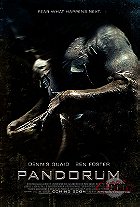 Posted : 12 years, 7 months ago on 17 November 2012 11:18
(A review of Pandorum)
Posted : 12 years, 7 months ago on 17 November 2012 11:18
(A review of Pandorum)TAKE Event Horizon, Alien, Pitch Black, Predator, Cube, Sunshine and pretty much every other sci fi/horror film you can think of, stir them all together, and you're part way to getting your head around Pandorum.
At first, that might seem like a potentially cool movie, but unfortunately the key word is "potentially".
The premise is gripping and compact - two officers on board a space voyage awake from hyper-sleep to find everyone else is dead or missing, the ship's power is out, they can't remember what happened, and there's something lurking out there in the darkness.
As their memories return, they realise they are onboard the Elysium, a Noah's Ark of sorts headed for an Earth-like planet to restart society.
But there's a lot standing in their way - scary creatures, survivors, a nuclear reactor that needs to be restarted, and there is always the dreaded onset of space madness (called pandorum in this movie).
While the film hopes to be a thoughful sci-fi with a psychological edge, it also wants to scare the dark matter out of you, and on both counts its a fail. The script is overburdened with ideas - the future of humanity, mutations, survival, paranoia, space discovery, the mental pressures of prolonged isolation, morality, judgment - most of which come off half-baked and are unfulfilling.
That's not to say that Pandorum is a total waste - there are enough ideas in there that occasionally some stick for a while, plus the alone-in-the-dark scenario has a few decent scares, even though you can't see what's going on half the time.
The film's main advantage is Foster and Quaid, who, despite the thin-ness of their characters, bring gravitas to roles that are straight out of the direct-to-DVD box.
But really the film is a mess - not surprising given that the director Alvart and writer Travis Milroy crafted the script out of two separate stories, attempting to mash them together.
Pandorum has its moments but ultimately its multitude of ideas proves to be a disadvantage rather than a plus.
At first, that might seem like a potentially cool movie, but unfortunately the key word is "potentially".
The premise is gripping and compact - two officers on board a space voyage awake from hyper-sleep to find everyone else is dead or missing, the ship's power is out, they can't remember what happened, and there's something lurking out there in the darkness.
As their memories return, they realise they are onboard the Elysium, a Noah's Ark of sorts headed for an Earth-like planet to restart society.
But there's a lot standing in their way - scary creatures, survivors, a nuclear reactor that needs to be restarted, and there is always the dreaded onset of space madness (called pandorum in this movie).
While the film hopes to be a thoughful sci-fi with a psychological edge, it also wants to scare the dark matter out of you, and on both counts its a fail. The script is overburdened with ideas - the future of humanity, mutations, survival, paranoia, space discovery, the mental pressures of prolonged isolation, morality, judgment - most of which come off half-baked and are unfulfilling.
That's not to say that Pandorum is a total waste - there are enough ideas in there that occasionally some stick for a while, plus the alone-in-the-dark scenario has a few decent scares, even though you can't see what's going on half the time.
The film's main advantage is Foster and Quaid, who, despite the thin-ness of their characters, bring gravitas to roles that are straight out of the direct-to-DVD box.
But really the film is a mess - not surprising given that the director Alvart and writer Travis Milroy crafted the script out of two separate stories, attempting to mash them together.
Pandorum has its moments but ultimately its multitude of ideas proves to be a disadvantage rather than a plus.
 0 comments, Reply to this entry
0 comments, Reply to this entry
Lie With Me review
 Posted : 12 years, 7 months ago on 15 November 2012 11:27
(A review of Lie With Me)
Posted : 12 years, 7 months ago on 15 November 2012 11:27
(A review of Lie With Me)Yet another ‘journey of erotic self-discovery’ film falls flatly on its face. And for the same old reason: we just couldn’t give a toss (no pun intended) about the characters. No-one seems to have realised yet that unless these are people with whom we want to spend intimate time, we’ll only resent it all the more as two models flaunt their full-frontal beauty in front of us.
Furthermore, shooting it like a hardcore perfume commercial doesn’t help. Ignore, unless you just have to see that guy from Six Feet Under and 24 get his bell out.
Furthermore, shooting it like a hardcore perfume commercial doesn’t help. Ignore, unless you just have to see that guy from Six Feet Under and 24 get his bell out.
 0 comments, Reply to this entry
0 comments, Reply to this entry
Weekend review
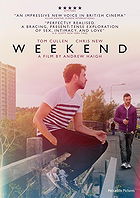 Posted : 12 years, 7 months ago on 15 November 2012 11:18
(A review of Weekend)
Posted : 12 years, 7 months ago on 15 November 2012 11:18
(A review of Weekend)Just when you start to despair for the future of a movie genre, along comes a specimen to prove it can still be found in the wild. Andrew Haigh’s remarkable Weekend (IFC Films) unassumingly, almost offhandedly, demonstrates the continuing existence of the romantic comedy, if a comedy can be defined as a story in which, by whatever amusingly circuitous route, love eventually wins out. This miniaturist romance takes place over the course of one weekend. The couple in question is gay, but the film never plays like an earnest brief on behalf of gay equality: See, we can fall in love too! Haigh is both honest and specific in his portrait of a particular milieu (the gay male culture of Nottingham, England), but Weekend’s appeal transcends orientation. If you’ve ever met someone who changed your life in the space of days, you’ll relate to something in this movie.
That’s assuming you can roll with Weekend’s rambling, discursive structure and hyper-naturalistic, occasionally indecipherable dialogue. In its apparently casual construction and focus on the lives of young people in flux, Weekend sometimes resembles the work of filmmakers like Lynne Shelton or Andrew Bujalski—an emerging style that’s often given a name I abjured last year for its imprecision and implied derision. (I swore never to use the word again in these pages, but it rhymes with “bumblesnore.”) It seems to me this approach to making movies is now established enough to merit a different name, and more sustained critical attention. Haigh shoots on digital video in an unobtrusive vérité style, and his actors’ overlapping interchanges sound so real you think they must be improvised. But they can’t be—the conversational beats are too precisely timed, with each change of subject taking the couple to a different, more intimate, and riskier place. (Haigh, who makes his living as a film editor, also wrote the script and edited.)
Russell (Tom Cullen, in a breakout debut performance) works as a lifeguard at a city pool. He’s a loner, and something of a stoner (one of the first things we see him do in his carefully appointed bachelor flat is wake and bake.) One night he hits a club, picks up a cute guy named Glen (Chris New), and takes him home for a one-night stand. In the morning, Glen asks if he can get Russell on tape narrating their night together for an art project he’s working on. The ensuing frank conversation exposes the differences between the two men: the proudly out Glen is boundary-pushing and playfully raunchy, while Russell is bashful and a bit prudish, still closeted to his co-workers and some of his family. Glen presses Russell to finish the job of coming out, and shruggingly recounts his own conversation with his parents at age 16: “I told ‘em, nature or nurture, it’s your fault. Get over it.”
There’s an immediate spark between these two wildly dissimilar men, but as Glen tells Russell the morning after their tryst, “I don’t do boyfriends.” Later, he’ll add a corollary that illuminates, to us if not to himself, the reason why: “I don’t do goodbyes.” But in the next 48 hours, Russell and Glen will find themselves doing a fair bit of both. As it turns out, Glen, a gallery employee, is about to leave for a two-year art course in America. (The class difference between the two men is subtly but sharply etched, with middle-class Glen just a bit more educated and upwardly mobile than the less privileged Russell.)
With Glen’s time in England about to run out, there’s no point in the pair getting any closer than they already have—but by the same logic, there’s no reason not to get close. They compress a whole love affair into a weekend, riding bumper cars and eating cotton candy at a carnival, then staying up all night doing cocaine and telling their life stories. They debate gay marriage: Russell finds it a defiant public expression of love, while Glen argues it’s a conformist capitulation to straight domestic mores. (It’s refreshing to hear someone in a movie give voice to this unorthodox but not uncommon opinion, one also expressed by Rachel Maddow in a recent interview.) Russell and Glen fight and make up, have epically hot (and mildly graphic) sex, say their farewells and then pop back to make one last point. Their inability to separate is almost comical, until suddenly, as Glen’s train to the airport is about to leave the station, it becomes unexpectedly painful and real.
There aren’t many films about relationships, gay or straight, that are this attentive to the details of modern courtship. I loved the moment when Glen and Russell, saying goodbye after their first night together, traded cell phones and awkwardly typed in their own numbers, neither seeming quite sure he wanted a second date. Andrew Haigh’s accomplishment is modest but significant: He’s made a sharply observed love story that’s funny without punch lines and romantic without sap. I won’t give away whether Russell and Glen get their happy ending, except to say that in its poignant final scenes Weekend offers a joyfully expanded vision of what romantic fulfillment can be.
 0 comments, Reply to this entry
0 comments, Reply to this entry
The Last House on the Left review
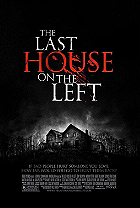 Posted : 12 years, 7 months ago on 15 November 2012 11:08
(A review of The Last House on the Left)
Posted : 12 years, 7 months ago on 15 November 2012 11:08
(A review of The Last House on the Left)Wes Craven's first film was a crude but shocking horror opus that, like George A. Romero's Night of the Living Dead (1968), became a grind house hit largely because it went much further than terror films before it had been willing to go. Often compared to Ingmar Bergman's stark medieval rape drama The Virgin Spring (1960) (though one wonders whether this was influence or just coincidence), Last House on the Left follows a group of teenage girls heading into the city when they hook up with a gang of drug-addled ne'er-do-wells and are brutally murdered. The killers find their way to the home of one of their victim's parents, where both father and mother exact a horrible revenge. Like Tobe Hooper's The Texas Chainsaw Massacre two years later, Last House on the Left was an unrelievedly dark vision of contemporary horror that inspired many future films which copied its effects without achieving its visceral impact.
 0 comments, Reply to this entry
0 comments, Reply to this entry
Eating Out: Drama Camp review
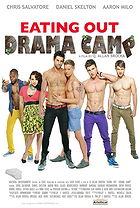 Posted : 13 years ago on 23 June 2012 06:05
(A review of Eating Out: Drama Camp)
Posted : 13 years ago on 23 June 2012 06:05
(A review of Eating Out: Drama Camp)If heterosexual lovers of juvenile sex comedies require regular helpings of "American Pie," equal-opportunity exploitation entitles gay male auds to a steady diet of "Eating Out." After co-writing the first two sequels to that crude but sometimes hilarious 2006 feature debut, series originator Q. Allan Brocka is back in the director's chair for "Eating Out: Drama Camp," the franchise's fourth installment but its first to bypass minimal theatrical release and go straight (ahem) to cable. Pic begins airing July 25 on Logo, where it should kill time painlessly enough for undiscriminating viewers. A fifth pic is already in production.
The still-superior initial outing is barely relevant here, as its cast members are long gone (prior series regular Rebekah Kochan appears just briefly as fan fave Tiffani), the throughline now being Zack (Chris Salvatore) and Casey (Daniel Skelton). Nice guy Casey having won hunky Zack in "Eating Out: All You Can Eat" two years ago, the couple is now in a relationship slump, their sex life dormant as Zack's roving eye grows more active.
Along with aspiring director pal Jason (Garikayi Mutambirwa), the thespian duo gets accepted to Dick Dickey's Drama Camp, run by the eponymous bitchy queen (Drew Droege). It's just like regular summer camp, albeit with attendees well past the age of consent, just as prior "Eating Out" pics were like teen comedies, except with 20-to-30-ish hardbodies (which made them perfectly ordinary teen comedies, of course). Despite that legal maturity and a roll call primarily consisting of hot L.A. gym bunnies, killjoy Dickey insists on "no sexual misconduct" -- a rule made to be broken if ever there was one.
Slender attempt at sustaining plot conflict finds the ebbing bond between Zack and Casey threatened by respective attractions to allegedly straight Benji (Aaron Milo) and definitely-not-straight Beau (Ronnie Kroell). Meanwhile, genuinely straight Jason is discomfited by his feelings for forthright transsexual Lilly (Harmony Santana of "Gun Hill Road").
These hankerings are tested in rehearsals for updated Shakespeare scenes that conveniently require maximum grappling, allowing fake bad acting to briefly displace the pic's occasional actual bad acting. Still, for the most part, what's required of the players (at least the male ones) is that they look good shirtless -- and on that level, the zero-body-fat casting is faultless. Climax is an exceedingly awkward onstage resolution of offstage tensions that turns into a public orgy.
In the script's one refreshing note, for once the imperiled central couple doesn't resist temptation. Like its immediate predecessor, "Drama Camp" gradually (if never entirely) downplays crass comedy for mild, earnest romantic drama -- plus a little softcore sex.
At this point, Brocka and co-scribe Phillip J. Bartell's writing process seems to consist of X number of cocktails providing X number of cocktail napkins on which to scribble wheezy single-entendres, pop culture references and flimsy excuses for disrobing. Subsidiary characters like Mink Stole's returning Aunt Helen or mean girl Genevieve (Marikah Cunningham) vanish for long stretches, as if forgotten or simply unavailable -- not that we miss them much. Celebrity casting on a budget means that several performers here are former reality-show contestants.
Given its own humble aspirations, "Drama Camp" isn't all that bad; it just doesn't try to be good. Assembly is passable.
The still-superior initial outing is barely relevant here, as its cast members are long gone (prior series regular Rebekah Kochan appears just briefly as fan fave Tiffani), the throughline now being Zack (Chris Salvatore) and Casey (Daniel Skelton). Nice guy Casey having won hunky Zack in "Eating Out: All You Can Eat" two years ago, the couple is now in a relationship slump, their sex life dormant as Zack's roving eye grows more active.
Along with aspiring director pal Jason (Garikayi Mutambirwa), the thespian duo gets accepted to Dick Dickey's Drama Camp, run by the eponymous bitchy queen (Drew Droege). It's just like regular summer camp, albeit with attendees well past the age of consent, just as prior "Eating Out" pics were like teen comedies, except with 20-to-30-ish hardbodies (which made them perfectly ordinary teen comedies, of course). Despite that legal maturity and a roll call primarily consisting of hot L.A. gym bunnies, killjoy Dickey insists on "no sexual misconduct" -- a rule made to be broken if ever there was one.
Slender attempt at sustaining plot conflict finds the ebbing bond between Zack and Casey threatened by respective attractions to allegedly straight Benji (Aaron Milo) and definitely-not-straight Beau (Ronnie Kroell). Meanwhile, genuinely straight Jason is discomfited by his feelings for forthright transsexual Lilly (Harmony Santana of "Gun Hill Road").
These hankerings are tested in rehearsals for updated Shakespeare scenes that conveniently require maximum grappling, allowing fake bad acting to briefly displace the pic's occasional actual bad acting. Still, for the most part, what's required of the players (at least the male ones) is that they look good shirtless -- and on that level, the zero-body-fat casting is faultless. Climax is an exceedingly awkward onstage resolution of offstage tensions that turns into a public orgy.
In the script's one refreshing note, for once the imperiled central couple doesn't resist temptation. Like its immediate predecessor, "Drama Camp" gradually (if never entirely) downplays crass comedy for mild, earnest romantic drama -- plus a little softcore sex.
At this point, Brocka and co-scribe Phillip J. Bartell's writing process seems to consist of X number of cocktails providing X number of cocktail napkins on which to scribble wheezy single-entendres, pop culture references and flimsy excuses for disrobing. Subsidiary characters like Mink Stole's returning Aunt Helen or mean girl Genevieve (Marikah Cunningham) vanish for long stretches, as if forgotten or simply unavailable -- not that we miss them much. Celebrity casting on a budget means that several performers here are former reality-show contestants.
Given its own humble aspirations, "Drama Camp" isn't all that bad; it just doesn't try to be good. Assembly is passable.
 0 comments, Reply to this entry
0 comments, Reply to this entry
 Login
Login
 Home
Home 89 Lists
89 Lists 46 Reviews
46 Reviews Collections
Collections